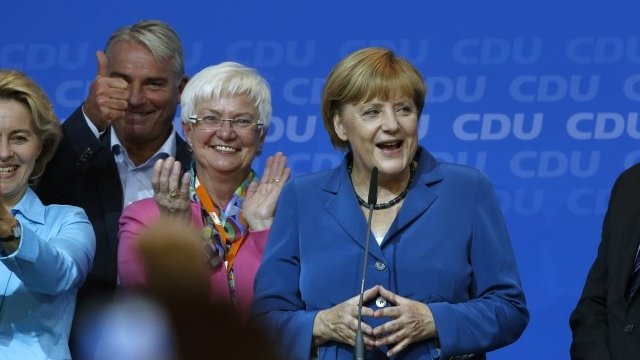當(dāng)前位置: Language Tips> 雙語新聞
Angela Merkel celebrates after German election win
分享到

|
German Chancellor Angela Merkel's conservative party has won elections but finished just short of an absolute majority, official results show. Mrs Merkel earlier urged her party to celebrate "a super result" after exit polls suggested she was set to win a historic third term. Her Christian Democrats (CDU) took about 42% of the vote. But she might yet have to seek a grand coalition with the Social Democrats (SPD) who won about 26% of the vote. Mrs Merkel's preferred liberal partners appear not to have made it into parliament. Exit polls for ARD public television put the liberal Free Democrats (FDP) on 4.7%, which if confirmed would be a disaster for the junior coalition partner, leaving it with no national representation in parliament. Party chairman Philipp Roesler called it "the bitterest, saddest hour of the Free Democratic Party". The FDP was beaten by the Green Party (8%) and the former communist Left Party (8.5%), and even, according to exit polls, the new Alternative fuer Deutschland, which advocates withdrawal from the euro currency and took 4.9%, just short of the parliamentary threshold. There was at one point speculation on German television that Mrs Merkel's CDU and their Bavarian sister CSU might even win enough seats for an absolute majority - the first in half a century. The ARD channel's projection had her group winning 297 seats against 301 for the other three parties, while ZDF had her even with the other three. 'Something fantastic' Mrs Merkel earlier addressed jubilant supporters at CDU headquarters. After waiting for chants of "Angie, Angie" to die down, she told them: "This is a super result." "We can celebrate tonight because we have done something fantastic." But, in a reference to coalition building, she said it was "too early to say exactly what we'll do". Correspondents say that the 59-year-old chancellor seemed to acknowledge the complexities of forming a government when she was asked on television if she planned to reach out to other parties. "Maybe we won't find anyone who wants to do anything with us," she replied. Correspondents say that the result is nevertheless a ringing endorsement of her steady leadership during the euro zone crisis. CDU parliamentary group leader Volker Kauder said that the party "has a clear mandate from voters to form a government". The outcome showed that "voters want Angela Merkel to remain chancellor" for a third term, he said. Mrs Merkel has made clear she would be prepared to work with the Social Democrats (SPD) in a grand coalition, as she did in 2005-09. The SPD has been more reluctant to consider linking up with the CDU/CSU again. The party leader, Peer Steinbrueck, was finance minister in the previous grand coalition, but has said he would not serve in such a government again. Correspondents say that whatever the shape of the coalition that ends up forming the government, there probably will not be any significant policy shifts, although there might be a slightly softer tone to Europe's debt crisis. Several weeks of difficult negotiations are expected. After the exit polls were released, but before official results were confirmed, Mr Steinbrueck conceded that it would be up to Mrs Merkel to decide how to proceed saying: "The ball is in Mrs Merkel's court. She has to get herself a majority." The BBC's Chris Morris, at Social Democrat headquarters, said Mr Steinbrueck was putting a brave face on it but the atmosphere was subdued. The SPD would have preferred to enter a coalition with the Green Party, but does not appear to have the votes to do so, and has ruled out a three-way alliance including the Left Party (Die Linke). Analysts think the SPD will probably agree to a coalition with the CDU/CSU. Turnout, projected at about 72%, was higher than at the last federal election - which had the worst on record. |
據(jù)英國廣播公司報(bào)道,德國官方大選統(tǒng)計(jì)結(jié)果顯示,德國總理安格拉?默克爾領(lǐng)導(dǎo)的基督教民主聯(lián)盟(CDU,簡稱基民盟)以42%的得票率贏得德國大選,但仍低于絕對多數(shù)。默克爾將開始?xì)v史性的第三任期,可能尋求與獲得26%選票的德國社會(huì)民主黨(SPD)組成大聯(lián)合政府。 默克爾期待的執(zhí)政伙伴自由民主黨(FDP)在這次大選中慘敗。根據(jù)德國公共廣播聯(lián)盟的民調(diào),自民黨僅獲得4.7%的選票,若此調(diào)查結(jié)果屬實(shí),自由民主黨將無緣聯(lián)邦議員席位。該黨主席菲利普?勒斯勒爾說,這是“自民黨成立以來最痛苦的時(shí)刻”。 根據(jù)民調(diào)結(jié)果,自民黨輸給了得票8%的綠黨和得票8.5%的左翼黨,甚至不敵新組的選擇黨,選擇黨主張拋棄歐元,本次得票4.9%,離進(jìn)入議會(huì)只有一步之遙。 德國公共廣播聯(lián)盟預(yù)測,默克爾領(lǐng)導(dǎo)的聯(lián)盟黨將在聯(lián)邦議院獲得297個(gè)席位,而其他3個(gè)黨派共占301個(gè)席位。 早些時(shí)候,默克爾在基民盟總部慶祝勝選,她向歡欣鼓舞的支持者說:“這是一個(gè)完美結(jié)果。今晚我們可以盡情慶祝,因?yàn)槲覀兺瓿闪藰O其出色的事情。”但提及組建執(zhí)政聯(lián)盟時(shí),她說:“現(xiàn)在決定我們將做什么還為時(shí)尚早。” 現(xiàn)年59歲的默克爾似乎認(rèn)識到組閣將錯(cuò)綜復(fù)雜。德國電視臺(tái)記者問她是否打算接觸其他黨派,她回應(yīng)說:“或許我們找不到愿意和我們共事的伙伴。”記者認(rèn)為,此次選舉結(jié)果是對默克爾在歐元區(qū)危機(jī)期間表現(xiàn)的認(rèn)可。 默克爾明確表示或?qū)?zhǔn)備與社民黨組成大聯(lián)合政府,像2005年到2009年那樣。而社民黨則一直不太愿意再次和聯(lián)盟黨合作。社民黨主席佩爾?施泰因布呂克在此前的大聯(lián)合政府中出任財(cái)政部長,但他曾表示不愿意再次為這樣的政府服務(wù)。 不過,施泰因布呂克承認(rèn)主動(dòng)權(quán)在默克爾,他說:“皮球在默克爾的場地一邊。她必須設(shè)法獲得多數(shù)席位。”社民黨更愿意與綠黨組閣,但選票似乎不夠,此外,社民黨還排除了一個(gè)包含左翼黨在內(nèi)三方聯(lián)盟。分析家認(rèn)為社民黨將可能同意與聯(lián)盟黨合作。 本次德國大選投票率約為72%,比上次大選的歷史最低記錄71.2%稍高。 相關(guān)閱讀 美流浪漢上交中國學(xué)生遺失巨款 獲捐款數(shù)萬美元 敘政府?dāng)M呼吁停火 普京稱無法100%確保敘交出化武 (譯者 聞竹 編輯 嚴(yán)玉潔) |
分享到
關(guān)注和訂閱


關(guān)于我們 | 聯(lián)系方式 | 招聘信息
電話:8610-84883645
傳真:8610-84883500
Email: languagetips@chinadaily.com.cn